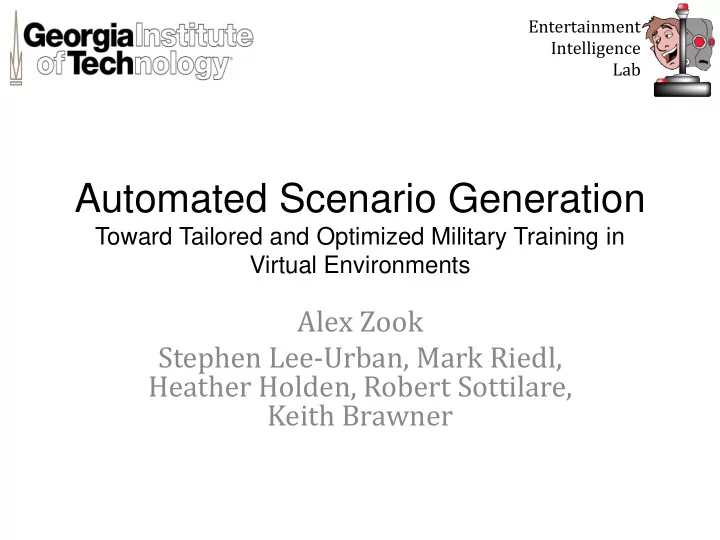

Entertainment Intelligence Lab Automated Scenario Generation Toward Tailored and Optimized Military Training in Virtual Environments Alex Zook Stephen Lee-Urban, Mark Riedl, Heather Holden, Robert Sottilare, Keith Brawner
Scenario-based Training patrol(market) • Scenario – script of make-friends(private) events for training bullied(sergeant) purposes … ambush() get-shot(private, leg) get-shot(sergeant, chest) enemy-retreat() give-care(sergeant, patch) get-thanked(sergeant) die(private)
Scenario-based Training Challenges drive-to(village) patrol(market) • Repeat to learn make-friends(private) – Many contexts for bullied(sergeant) same skill … investigate(house) attack(villager) ambush() get-shot(private, leg) get-shot(sergeant, chest) subdue(villager) enemy-retreat() give-care(sergeant, patch) get-thanked(sergeant) die(private)
Scenario-based Training patrol(market) • Repeat to learn make-friends(private) – Many contexts for bullied(sergeant) same skill … • Varying learner ambush() get-shot(private, leg) needs get-shot(sergeant, arm) get-shot(sergeant, chest) – Tailoring to user enemy-retreat() abilities give-care(sergeant, patch) give-care(sergeant, tourniquet) get-thanked(sergeant) die(private)
Scenario-based Training patrol(market) patrol(jungle) • Repeat to learn make-friends(private) – Many contexts for bullied(sergeant) same skill … • Varying learner needs ambush() – Tailoring to user get-shot(private, leg) abilities get-shot(sergeant, chest) • Changing deployment enemy-retreat() contexts give-care(sergeant, patch) – Reauthoring content get-thanked(sergeant) die(private)
Scenario Generation Goals 1. 1. Augment authoring volume with automated generation 2. 2. Tail ilor scenarios to individual differences 3. Generate content on on-demand
Automated Scenario Generation • Automated generation of training scenarios given knowledge of: – learning objectives – learner attributes – domain knowledge • domain content • scenario quality evaluation
Automated Scenario Generation author domain learning knowledge objectives scenario learner generator attributes scenario learner
Automated Scenario Generation author domain learning authoring knowledge objectives augmentation scenario learner generator attributes content tailoring scenario learner
Generation Methods • planning vs genetic algorithms – causal coherence vs evaluation optimality – result construction vs iterative modification – construction knowledge vs result evaluation knowledge • incremental vs final result criteria
Generation Methods PLANNING patrol(market) make-friends(private) ambush() bullied(sergeant) ambush() give-care(private, arm) …
Generation Methods PLANNING GENETIC ALGORITHM patrol(market) patrol(market) make-friends(private) make-friends(private) make-friends(private) ambush() bullied(sergeant) give-care(private, arm) bullied(sergeant) bullied(sergeant) … …
Genetic Algorithms • Inputs: Initialization – Event templates – Event ordering Selection constraints – Evaluation grammar • Output: Reproduction – Scenarios with fitness values Termination 14
Generation • Event templates make-friends(?character) get-shot(?character, ?injury type) give-care(?character, ?care-type)
Evaluation • Evaluation – evaluation functions • character use • event use • scenario length • … – evaluation grammar – learner model
Evaluation Functions • example: character use + few characters + character reuse across events
Evaluation Grammar hurt-friend injury-care make-friends(?character) get-shot(?character, ?injury type) get-shot(?character, ?injury type) give-care(?character, ?care-type) care-friend hurt-friend injury-care
Learner Model • Match predicted to desired performance Performance Events
Scenario Generator Evaluation • How do you compare generation systems? • System dynamics – Quality over time – Diversity over time • Human evaluation
System Dynamics • Scenario Quality – evaluation functions + evaluation grammar
System Dynamics • Scenario Diversity – scenario population edit distance
Human Evaluation • Generator measures – actual vs predicted performance • Subjective measures – difficulty – enjoyment • Outside validation – paper test of learning – on-field performance
Thanks! Questions?
Recommend
More recommend